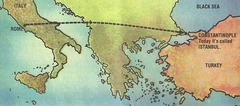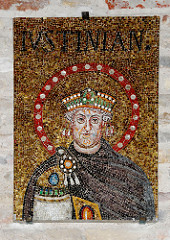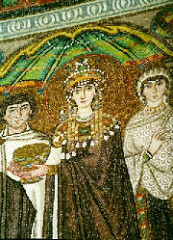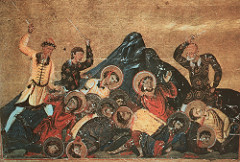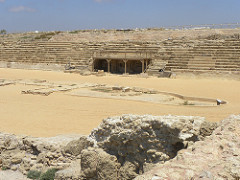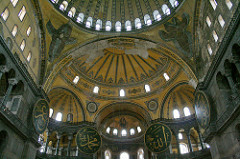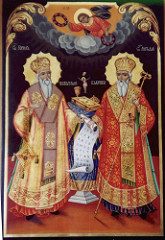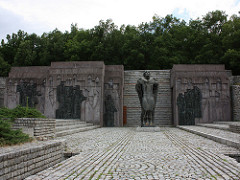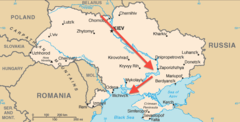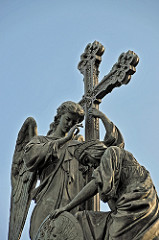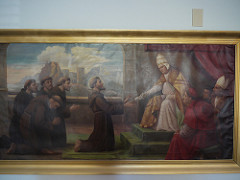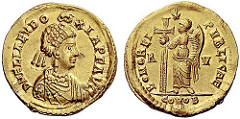Constantinople
Previously known as Byzantium, Constantine changed the name of the city and moved the capitol of the Roman Empire here from Rome. It was strategically located for trade and defense purposes. Later became the capital of the Ottoman Empire and is know known as Istanbul
Justinian
Byzantine emperor in the 6th century A.D. who reconquered much of the territory previously ruler by Rome, initiated an ambitious building program , including Hagia Sofia, as well as a new legal code, people thought he was a "moron", was married to Theodora. Wanted to recapture "Old Rome".
Procopius
Historian of the Byzantine Empire who in his "Secret History" revealed the cruelty of the autocratic system in which the emperor ruled by divine providence., Wrote two histories of Byzantine Emperor Justinian's rule. One good and sponsored by Justinian, one bad and secret.
Secret History
Written by the historian Procopius; says bad things about Justinian and his wife(Theodora); published posthomuously
Theodora
The wife of Justinian, she helped to improve the status of women in the Byzantinian Empire and encouraged her husband to stay in Constntinople and fight the Nike Revolt. Was seen as being overambitious, and power hungry by the public.
Nike Revolt
A revolt in which riots were started due to team rivalries in the chariot races (specifically the Greens and Blues). Justinian arrested the leaders of the Greens and Blues and sentenced them to hang, which made the people angry. The revolt happened in the Hippodrome against Justinian for imprisoning the leaders of two chariot racing groups. His actions of slaughtering all the rebels at once was considered one of the bloodiest things ever decreed by an emperor against his own people.
Hippodrome
Built by Justinian; A huge stadium; Held athletic events and games; Seated 60,000 people located in Constantinople. Site of Nike Revolt
Hagia Sophia
Most famous example of Byzantine architecture, it was built under Justinian I and is considered one of the most perfect buildings in the world.
Cyril
Along with Methodius, missionary sent by Byzantine government to eastern Europe and the Balkans; converted southern Russia and Balkans to Orthodox Christianity; responsible for creation of written script for Slavic known as Cyrillic.
Methodius
Along with Cyril, missionary sent by Byzantine government to eastern Europe and the Balkans; converted southern Russia and Balkans to Orthodox Christianity; responsible for creation of written script for Slavic known as Cyrillic.
Magyars
Muslims who attacked Europe and converted to Christianity and established Hungary, barbarian people who migrated into southern Europe, and in the early 10th century ad occupied Hungary, from where their horsemen raided into France, Italy, Germany, and even Spain
Belisarius
One of Justinian's most important military commanders during period of reconquest of Western Europe; commended in North Africa and Italy, best general of the late Roman world, quickly destroyed Vandals in North Africa, defeated Ostrogoths in 552, , slaughted rebels in Nike Rebellion
Greek Fire
Byzantine weapon consisting of mixture of chemicals (petroleum, quicklime, sulfur) that ignited when exposed to water; utilized to drive back Arab fleets that attacked Constantinople
Bulgaria
Slavic kingdom established in northern portions of Balkan peninsula; constant source of pressure on Byzantine Empire; defeated by Emperor Basil II in 1014
tsar
From Latin caesar, this Russian title for a monarch was first used in reference to a Russian ruler by Ivan III (r. 1462-1505).
Basil II
Emperor who led the Byzantines to their last period of greatness; nicknamed "Basil the Bulgur Slayer"
Byzantine
characterized by elaborate scheming and intrigue
Icon
a representation or image of a sacred personage, often considered sacred itself; an image or picture; a symbol; a graphic symbol on a computer monitor display; an object of blind devotion
Great Schism
a period of division in the Roman Catholic Church, 1378-1417, over papal succession, during which there were two, or sometimes three, claimants to the papal office
Battle of Manzikert
A battle between the Byzantine Empire and Seljuk Turks (Muslims) in 1071, where the Byzantine lost; as a result, the Byzantine asked Europe for help.The turkish victory allowed them to take over most of the anatolian peninsula
Fourth Crusade
Initiated by Pope Innocent III six or seven years after Saladin's death; crusaders attacked Constantinople and set up their own government; Byzantine Empire restored by 1261 but never fully recovered from the fourth crusade
Kiev
Trade city in southern Russia established by Scandinavian traders in 9th century; became focal point for kingdom of Russia that flourished to 12th century.
Dnieper River
Flows from Russia through Belarus and Ukraine to the Black Sea. Kiev is a port city here.
Rurik
Legendary Scandinavian(Swedish), regarded as founder of the first kingdom of Russia based in Kiev in 855 C.E.
Rus
Slavic word for "Viking"; land Rurik the Viking ruled was called "Rus" or "Russia"
Vladimir I
Grand prince of Kiev who converted to Orthodox Christianity and made it the state religion, One of the first Czars; Tried to expand south, which conflicted with Byzantine Empire. Eventually formed deal with emperor of BE
Russian Orthodox
Church that developed under Vladimir I whose priests were trained from church leaders imported from Byzantium. This king characteristically ruled over the church as well as many major appointments, shows east west divide.
Yaroslav
Vladimir's son became a Grand Prince in A.D. 1019. Under his rule, Kievan culture reached its "Golden Age". First library established and legal system organized.
Boyars
Russian aristocrats; possessed less political power than did their counterparts in western Europe
Tatars
Mongols who captured Russian cities and destroyed the Kievan state in 1236. However, they left the Russian Orthodox church and aristocracy intact.
Greek
of or relating to or characteristic of Greece or the Greeks, actually used more in the Eastern civilization than in Western/
Siege of Constantinople
The Ottoman Empire(Sultan conquered Constantinople in 1453. Through expansion into the Balkans and the Mediterranean the Ottoman empire gained political stability. From a European perspective this event ended the Middle Ages and gave way for the Renaissance.
Russia
formerly the largest Soviet Socialist Republic in the USSR occupying eastern Europe and northern Asia
Balkans
a large peninsula in southeastern Europe containing the Balkan Mountain Range, , including Albania, Bulgaria, Greece, Romania, and Yugoslavia
Seljuk Turks
nomadic invaders from Central Asia via Persia; staunch Sunnis; ruled in the name of Abbasid caliphs from mid-11th century; able to restore political initiative to the much reduced caliphate; ended threat of Shi'a conquest
Ravenna
Capital in Western Roman Empire, more strategic than Rome, easily accessible by sea from Constantinople and gave access to Rhine frontier (area of greatest military urgency).
Pope Innocent II
Most powerful pope; claimed to rule the whole world; covened 4th Lateran Council---annual confession of sin mass on Easter, mass became sacrifice, Jews live in ghettos, declared ordeal system was "irrational"
Pope Innocent III
clashed with King John and won; Church reached height of political power under his papacy; believed pope was the supreme judge of all European affairs; used interdicts, initiated the Fourth Crusade. Summoned the Albigension Crusade. Creates order of the Franciscans- formed to fight heresy.
Lateran Council
These were gatherings of high ranking Church officials in a council, formed to resolve issues within the Church.
Ordeal System
An early form of Medieval justice: a task was assigned for wrongdoing.
Emperor Leo III
Byzantine emperor who founded Syrian dynasty and sucessfully avoided Arab invasions, , Byzantine emperor who banned the use of icons., 730 AD; banned the use of icons; had his army break into churches and smash icons
Mehemet II
Restored the Ottoman military to it's former power. Kept empire expanding. Defeated the Venetians, invaded Hungary, overcame Italian crusaders,repelled by Greek Fire
